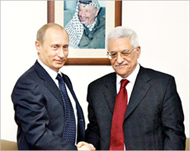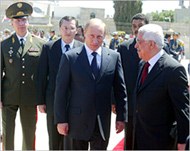Putin offers aid and arms to Palestine
Russian President Vladimir Putin has pledged aid and military equipment to the Palestinians to reform, boost security and rebuild the shattered economy, as he wound up a historic Middle East tour.

Putin, the first Kremlin leader to visit Israel and the Palestinian territory, on Friday held talks with Palestinian leader Mahmud Abbas in the West Bank after a day of negotiations with Israeli officials and a two-day stop in Egypt.
“Russia will continue to offer aid to the Palestinian Authority to implement reforms and construct a state,” Putin said.
“We support the efforts of President Abbas to reform the security services and fight against terrorism.”
Despite Israeli complaints that Abbas is not doing enough to crack down on Palestinian fighters, Putin confirmed that Russia would provide military training and equipment to Palestinian security forces.
“We will give the Palestinian leadership technical help and deliveries of equipment and training,” Putin said, while promising that aviation technology and helicopters would come first, along with law enforcement training in Moscow.
 |
|
Putin came to the West Bank |
“If we expect President Abbas to fight effectively against terrorism, we cannot expect him to do this with stones,” Putin said.
“We want this cooperation to be fully transparent and not cause any concern on the Israeli side,” the Russian leader stressed fresh from his talks in Jerusalem.
He also called for Palestinian prisoners to be freed and limitations on the freedom of movement to end, saying: “I am not sure these restrictions really help the fight against terrorism effectively.”
Middle East conference
In return, Abbas welcomed Putin’s offer to host a conference on the Middle East in Moscow in a bid to push forward the stagnant peace process. “The conditions are ripe,” he said.
But Putin’s offer to host such an event elicited only cool responses from the United States and Israel.
Abbas reiterated the Palestinians’ commitment to the internationally drafted peace road map and said his government was willing to coordinate with Israel over this summer’s pull out of troops and settlers from the Gaza Strip.
“We are committed to the implementation of a just peace with our Israeli neighbours and do not want to miss the opportunity, which has presented itself.”
Russia, along with the European Union, the United Nations and the United States, is a sponsor of the road map, a phased blueprint which aims for the creation of a Palestinian state alongside a secure Israel.
Nuclear proliferation
Putin also warned of the dangers of nuclear proliferation in the Middle East, while defending Moscow’s nuclear cooperation with Iran.
Earlier, he laid a wreath at the tomb of veteran Palestinian leader Yasir Arafat, after Abbas rolled out the red carpet, greeting Putin with a Palestinian guard of honour that played a rough rendition of the Russian anthem.
 |
|
Putin warned of the dangers of |
A few dozen Russian women looked on from outside the gates of the Palestinian leadership compound, welcoming Putin’s arrival. Abbas, who once lived and studied in Russia, had visited Moscow on his first overseas trip after being elected Arafat’s successor last January.
Hailed as a moderating influence, he has since won US approval for his vow to use an “iron fist” against anyone who violated a de facto truce with Israel.
Putin sought to use his landmark tour of the Middle East to restore some of Moscow’s lost influence in the region, with Israeli-Palestinian peace negotiations figuring prominently during hours of talks with Sharon on Thursday.
Soviet governments developed close links with Arab counterparts in an attempt to counter-balance US support for the region’s main military power, Israel. But Putin has been stressing his desire for cooperation with Israel.
However, disagreements remain, including Russia’s plan to sell short-range anti-aircraft missiles to Syria, and continuing cooperation with Iran’s atomic power industry.